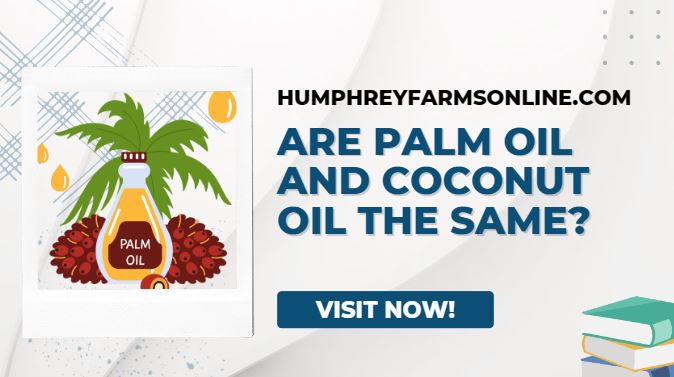
Your food is only as healthy as the oil you use to cook it! With the rise of various cooking oils in the market, many people find themselves asking, “Are palm oil and coconut oil the same?”
Let’s dive into the details to clarify their differences and help you choose the right oil for your culinary needs.
Also, Read
How Profitable Is Palm Oil Business In Nigeria
Origin of Palm Oil and Coconut Oil
Understanding the origins of these oils can help inform your choice:
- Coconut Oil: Sourced from coconuts, primarily grown in tropical regions like India and Sri Lanka. It has been a staple in Indian cooking for centuries.
- Palm Oil: Derived from the fruit of palm trees, mainly found in African countries. Its usage has rapidly increased due to its availability and cost-effectiveness.

Smoke Point Comparison
The smoke point is the temperature at which an oil begins to break down and produce harmful compounds. Here’s how they compare:
- Palm Oil: 235°C
- Coconut Oil: 170–180°C
- Olive Oil: 190°C
Conclusion: Palm oil has the highest smoke point, making it ideal for high-heat cooking, while coconut oil is better for moderate temperatures.
Fatty Acid Composition
When it comes to health, the fatty acid content of these oils matters:
- Coconut Oil: Rich in healthy saturated fats that may help lower cholesterol levels.
- Palm Oil: Contains saturated fats but may increase cholesterol due to phytosterols.
- Olive Oil: High in monounsaturated fats, beneficial for heart health.
Health Benefits
Both oils offer unique health advantages:
- Coconut Oil: Antimicrobial properties, good for heart health, and easily digestible.
- Palm Oil: Contains antioxidants but should be consumed in moderation due to its potential cholesterol-raising effects.
Availability and Uses
Both oils are widely available but have different applications:
- Coconut Oil: Popular for cooking, baking, and skincare. Cold-pressed varieties retain more nutrients.
- Palm Oil: Commonly found in processed foods and snacks due to its low cost. It’s less frequently used for direct cooking.
Cooking with Palm Oil vs. Coconut Oil
- Palm Oil: Ideal for deep frying due to its high smoke point. It’s commonly used in African and Asian cuisines.
- Coconut Oil: Adds a sweet flavor and is excellent for sautéing, baking, and even in beverages like coffee.
FAQs
1. Is coconut oil healthier than palm oil?
Both have pros and cons; coconut oil is generally more nutrient-dense, while palm oil is better for high-heat cooking.
2. Can you use palm oil in place of coconut oil?
Yes, but keep in mind their flavor profiles and nutritional differences.
3. What is the best oil for cooking?
Cold-pressed coconut oil and high-quality palm oil are great options depending on your cooking method.
Which Is Healthier Palm Oil Or Coconut Oil?
When considering which oil is healthier—palm oil or coconut oil—it’s crucial to understand their saturated fat content and how it affects heart health.
Saturated fats can raise levels of “bad” LDL cholesterol and triglycerides in the bloodstream. High levels of these can lead to an increased risk of heart disease. Palm oil contains around 50% saturated fat, which is significant but not as high as coconut oil and palm kernel oil. Coconut oil has more than 85% saturated fat, and palm kernel oil is similarly high.
Because palm oil has a lower saturated fat percentage, it tends to have a more balanced fatty acid profile. This means it includes a higher proportion of healthier fats, like monounsaturated and polyunsaturated fats, which can be better for heart health. In contrast, the high saturation in coconut oil and palm kernel oil can make them less favorable for heart health, especially for those concerned about cholesterol levels.
In summary, while both oils are often used in cooking and food products, palm oil may be the healthier choice, particularly for those worried about heart disease, due to its lower saturated fat content and better fatty acid composition.
What Oil Is Better Than Palm Oil?
When exploring alternatives to palm oil, one of the best options is olive oil, particularly extra virgin olive oil.
While palm oil is commonly found in many packaged foods, you may not see it as a standalone item in grocery stores.
Olive oil, on the other hand, is widely available and highly regarded for its flavor and health benefits.
Flavor Comparison
Both oils have unique tastes. Palm oil, derived from the fruit of oil palm trees, has a mild, earthy flavor, somewhat reminiscent of carrots or pumpkins.
This neutral profile allows it to blend well in various dishes, which is why it’s often used in many processed foods.
Conversely, olive oil offers a rich and varied flavor that can be peppery, grassy, or sharp, depending on the olives used.
Extra virgin olive oil, which is unrefined, delivers the most intense taste. Additionally, flavored olive oils infused with herbs or citrus can add an exciting twist to your cooking.
Health Benefits
From a nutritional standpoint, olive oil outshines palm oil. Palm oil is made up of about 50% saturated fat, which can raise “bad” LDL cholesterol levels—a concern for heart health.
In contrast, olive oil contains only around 14% saturated fat, with about 75% being monounsaturated fats, known for their heart-healthy properties.
The presence of beneficial fats in olive oil makes it a much healthier choice.
In addition to healthy fats, both oils provide vitamin E, but olive oil also boasts other beneficial compounds like polyphenols and antioxidants, which contribute to its overall health benefits.
Cooking and Frying
When it comes to cooking, both oils can handle moderate temperatures. Palm oil has a slightly higher smoke point at around 450°F, compared to extra virgin olive oil’s smoke point of about 400°F. However, both are suitable for most home cooking methods, including frying.
Environmental Impact
Another important factor to consider is the environmental impact. The palm oil industry has been linked to significant deforestation, leading to the destruction of rainforests and habitats for endangered species.
The clearing of land often involves burning, which contributes to air pollution, and palm oil production can lead to water and soil contamination.
On the other hand, olive oil, especially when sourced from smaller, sustainable farms, generally has a lower environmental impact. By choosing local or smaller-scale producers, you can support practices that are better for the planet.
============================
In summary, if you’re looking for an oil that is better than palm oil, extra virgin olive oil is an excellent choice. It offers superior flavor, health benefits, and a more positive environmental footprint. Whether you’re cooking, frying, or dressing salads, olive oil stands out as a healthier and more sustainable option.
Conclusion
In the battle of palm oil vs. coconut oil, each oil has its strengths and weaknesses. While palm oil is excellent for high-heat cooking, coconut oil shines with its health benefits and versatility.
Choosing the right oil for your kitchen depends on your cooking style, health considerations, and flavor preferences.
Remember, the key is to select high-quality, cold-pressed oils whenever possible for the best health benefits!

Leave a Reply
You must be logged in to post a comment.